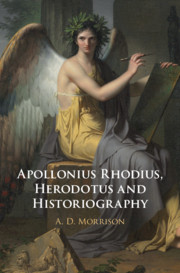Book contents
- Apollonius Rhodius, Herodotus and Historiography
- Apollonius Rhodius, Herodotus and Historiography
- Copyright page
- Dedication
- Contents
- Preface
- Abbreviations
- Introduction
- Chapter 1 Receiving Herodotus
- Chapter 2 Creating Authorities
- Chapter 3 Explaining the Past
- Chapter 4 Telling Stories
- Chapter 5 Greeks and Non-Greeks
- Chapter 6 Kings and Leaders
- Conclusions and Consequences
- Select Bibliography
- Index of Subjects
- Index of Passages
Chapter 5 - Greeks and Non-Greeks
Published online by Cambridge University Press: 13 January 2020
- Apollonius Rhodius, Herodotus and Historiography
- Apollonius Rhodius, Herodotus and Historiography
- Copyright page
- Dedication
- Contents
- Preface
- Abbreviations
- Introduction
- Chapter 1 Receiving Herodotus
- Chapter 2 Creating Authorities
- Chapter 3 Explaining the Past
- Chapter 4 Telling Stories
- Chapter 5 Greeks and Non-Greeks
- Chapter 6 Kings and Leaders
- Conclusions and Consequences
- Select Bibliography
- Index of Subjects
- Index of Passages
Summary
There is, as we have seen, a clear point of contact between Apollonius and Herodotus in the Argonautica’s use of elements of ethnographic discourse and what we might term an ethnographic approach to the heroic world.1 But the importance of Herodotean ethnography for Apollonius is not confined to adopting ethnographic attitudes or language. Central to Herodotus’ historical project is the examination of Greeks and non-Greeks (see Hdt.1. prol.), in large part because these are two fundamental categories with which Herodotus parcels up the world,2 and understanding each of them and their relationship is crucial to understanding how they came to war with one another. As we shall see in this chapter, Herodotus’ descriptions of different ethnic groups, including Greeks, are complex and the relationship between Greeks and non-Greeks is not a straightforward picture of superior Greeks and inferior, utterly different barbarians,3 not least because the Greeks are not a homogeneous group and the categories are not impossible to bridge, from the long view of the historian. We investigate here how the particular descriptions of different peoples in Herodotus form crucial reference-points for Apollonius and his readers for the Argonautica’s own complex descriptions of Greeks, non-Greeks and their interaction. Thus this chapter follows on from the previous one in examining particular passages or sections of Herodotus as a modello-esemplare for elements of the Argonautica. The use of Herodotean ethnographic descriptions in the epic will in turn have consequences for our reading of the relationship of the poem to its Ptolemaic socio-political context, since the place of Herodotus’ picture of Egypt within the Argonautica will be a key focus. Some recent readings of the Argonautica against this Ptolemaic context have sought to closely identify Colchis in the poem with Egypt (especially as depicted in Herodotus). I argue here that Apollonius’ employment of Herodotus and a wider range of ethnographic descriptions alongside closer critical attention to some crucial patterns and passages in Greek ethnographic writing more widely suggest that this identification cannot straightforwardly be made. Indeed, Apollonius’ portrayals of different ethnoi are, like Herodotus’, complex and do not usually allow one-to-one correspondences with Hellenistic analogues to be drawn. In order to begin our investigation of Apollonius’ use of specific ethnographic descriptions from Herodotus, we shall first briefly examine the conceptions of the worlds Greeks inhabit and their limits in the two texts.
- Type
- Chapter
- Information
- Apollonius Rhodius, Herodotus and Historiography , pp. 145 - 178Publisher: Cambridge University PressPrint publication year: 2020

